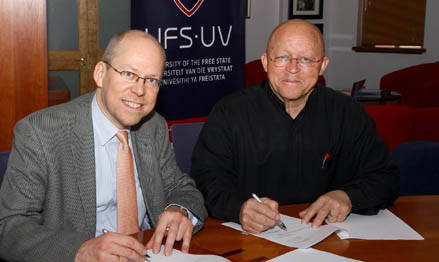Latest News Archive
Please select Category, Year, and then Month to display items
02 January 2025
|
Story Gerda-Marie van Rooyen
|
Photo Supplied
 Leading the research in South Africa is Prof Linus Franke from the Department of Soil, Crop and Climate Sciences.
Leading the research in South Africa is Prof Linus Franke from the Department of Soil, Crop and Climate Sciences.
Scientists are actively pursuing the successful breeding of diploid hybrid potatoes from inbred lines. This is expected to revolutionise potato breeding as it holds the key to rapid genetic progress. It will introduce new varieties for commercialisation through seed. Currently, existing potato variants have a gene that renders self-pollinated seeds infertile.
Prof Linus Franke, an academic in the Department of Soil, Crop and Climate Sciences at the UFS, is leading the research in South Africa. “This technology allows the production of genetically uniform potato seed that is easy to transport and largely disease-free.” He says this differs from conventional breeding whereby only vegetative propagation is possible due to tetraploid varieties in potatoes. It also risks carrying pests and diseases from one generation to the next – leading to the accumulation of pests and diseases with each round of multiplication.
Seed innovation
Prof Franke explains that Solynta BV, a seed company based in the Netherlands that produces potato varieties that can be grown from seed, has included South Africa in their research efforts because it is one of Africa’s largest producers and exporters. Through his academic relationship with Wageningen University and Research, a Dutch institution renowned for its agricultural endeavours and food production, the UFS became involved in researching hybrid potatoes grown from seed.
Diploid seeds containing two sets of chromosomes allow easier gene manipulation to increase predictability and speedier genetic progress. The breeding approach enables the incorporation of tolerance to pests, diseases, abiotic stresses (cold, heat, drought) and other desired genetic traits.
Although Prof Franke is optimistic about this research, he is not blind to disadvantages. “Potato seeds are tiny and have little energy reserves, making it harder to grow potatoes from seed than from tubers.” He says potatoes from seed will take longer to cultivate than tubers, as farmers need to grow plantlets from seeds first, adding six weeks to the growing period. “It is possible that commercial farmers can grow potatoes directly from seed. Alternatively, perhaps more likely, specialised growers will produce tubers of potatoes from seed; these tubers are then sold as seed tubers to other potato farmers, who then continue their normal practices of producing potatoes for the market from tubers.”
Financial benefits
Prof Franke says farmers have reason to get excited. “Seed potatoes will reduce input costs, as varieties with enhanced tolerance to pests and diseases require less pesticides. Planting one hectare of potatoes requires three to four tonnes of potato tubers, but only one 25 g packet of potato seeds.” Since potatoes are a more valuable commodity than maize, this technology might also increase farmers’ income potential.
Strengthening ties with Belgium ally
2013-10-31
|
 |
From the left are: Prof Dr Johan Meeusen signing the agreement with Prof Nicky Morgan, Vice-Rector: Operations.
Photo: Hannes Pieterse
31 October 2013 |
The UFS signed a formal agreement with the University of Antwerp, strengthening the two institutions’ existing collaboration. Prof Dr Johan Meeusen, Vice-Rector and Professor of European Law and Private International Law at the University of Antwerp, visited the Bloemfontein Campus to sign the agreement. This arrangement will ensure that the two institutions work in close conjunction on research and additional projects.
Dineo Gaofhiwe-Ingram, Assistant Director: Internationalisation, says the new relationship between the two universities will have a strong research focus. "It’s evident and known that we want to become a research-intensive university.” She emphasises that the relationship with Antwerp as well as partnerships with a variety of other institutions are crucial. These will ensure that young emerging scholars, like those taking part in the Vice-Chancellor's Prestige Scholars Programme, are exposed internationally during their development. “We hope that some of the scholars in the new cohort of the PSP will be able to find scientists to host them at Antwerp," Gaofhiwe-Ingram adds.
In addition, she explains that this formal agreement will augment pre-existing collaborations with the Unit for Language Facilitation and Empowerment, as well as the Centre for Health Systems Research and Development. It will also open up cooperation between other faculties and disciplines. “Through Eurosa/Erasmus Mundus Project, which awards scholarships to South African students and staff to study in Europe, the 2014 project will now also award scholarships to European students and staff to come and study in South Africa,” Gaofhiwe-Ingram announced.
The University of Antwerp is one of the European associates that participates in the Leadership for Change Programme and hosted a group of first-year Kovsie students during 2011. In 2012, representatives from the University of Antwerp attended the Leadership Summit presented on the Bloemfontein Campus. Another group of first-year students from the UFS took part in this year’s programme.